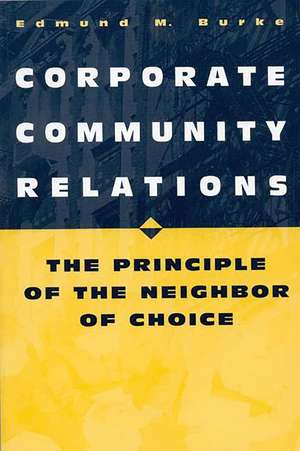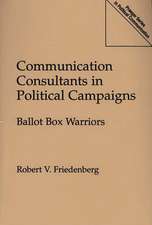Corporate Community Relations: The Principle of the Neighbor of Choice
Autor Edmund M. Burkeen Limba Engleză Paperback – 27 feb 1999 – vârsta până la 17 ani
| Toate formatele și edițiile | Preț | Express |
|---|---|---|
| Paperback (1) | 236.69 lei 6-8 săpt. | |
| Bloomsbury Publishing – 27 feb 1999 | 236.69 lei 6-8 săpt. | |
| Hardback (1) | 461.95 lei 6-8 săpt. | |
| Bloomsbury Publishing – 27 feb 1999 | 461.95 lei 6-8 săpt. |
Preț: 236.69 lei
Preț vechi: 291.56 lei
-19% Nou
Puncte Express: 355
Preț estimativ în valută:
45.30€ • 48.90$ • 37.99£
45.30€ • 48.90$ • 37.99£
Carte tipărită la comandă
Livrare economică 19 aprilie-03 mai
Preluare comenzi: 021 569.72.76
Specificații
ISBN-13: 9780275964719
ISBN-10: 027596471X
Pagini: 208
Dimensiuni: 156 x 235 x 12 mm
Greutate: 0.31 kg
Editura: Bloomsbury Publishing
Colecția Praeger
Locul publicării:New York, United States
ISBN-10: 027596471X
Pagini: 208
Dimensiuni: 156 x 235 x 12 mm
Greutate: 0.31 kg
Editura: Bloomsbury Publishing
Colecția Praeger
Locul publicării:New York, United States
Notă biografică
EDMUND M. BURKE is Founder and Director Emeritus of the Boston College Center for Corporate Community Relations./e He has worked with over 800 corporations around the world doing executive education, consultation, and research. He has taught community planning in graduate schools of social work and worked as a community planner in Williamsport and Pittsburgh, Pennsylvania and Marion, Ohio. Dr. Burke served as Dean of the Graduate School of Social Work at Boston College. He was a member of the White House Domestic Policy Council from 1978 to 1980, and he chaired the White House Conference on Strategic Planning.
Cuprins
Foreword: Why Merck Needs to Be a Neighbor of Choice by Raymond V. GilmartinIntroduction: The New Expectations for Today's CorporationThe Principle of the Neighbor of ChoiceThe Psychological ContractFrom Balloons and T-Shirts to Neighbor of ChoiceHow to Achieve a Competitive AdvantageImplementing Neighbor of ChoiceThe Company AssessmentWho Are the Corporation's Communities?The "Shadow Constituencies"The Community AssessmentThe Three StrategiesThe First Strategy: Building Relationships of TrustThe Second Strategy: Managing Community Issues and ConcernsThe Third Strategy: Using Community Programs to Build Trust.And Achieve a Competitive AdvantageThe Social VisionShaping a Social Vision: The Value Premise of the Neighbor of ChoiceIndex
























